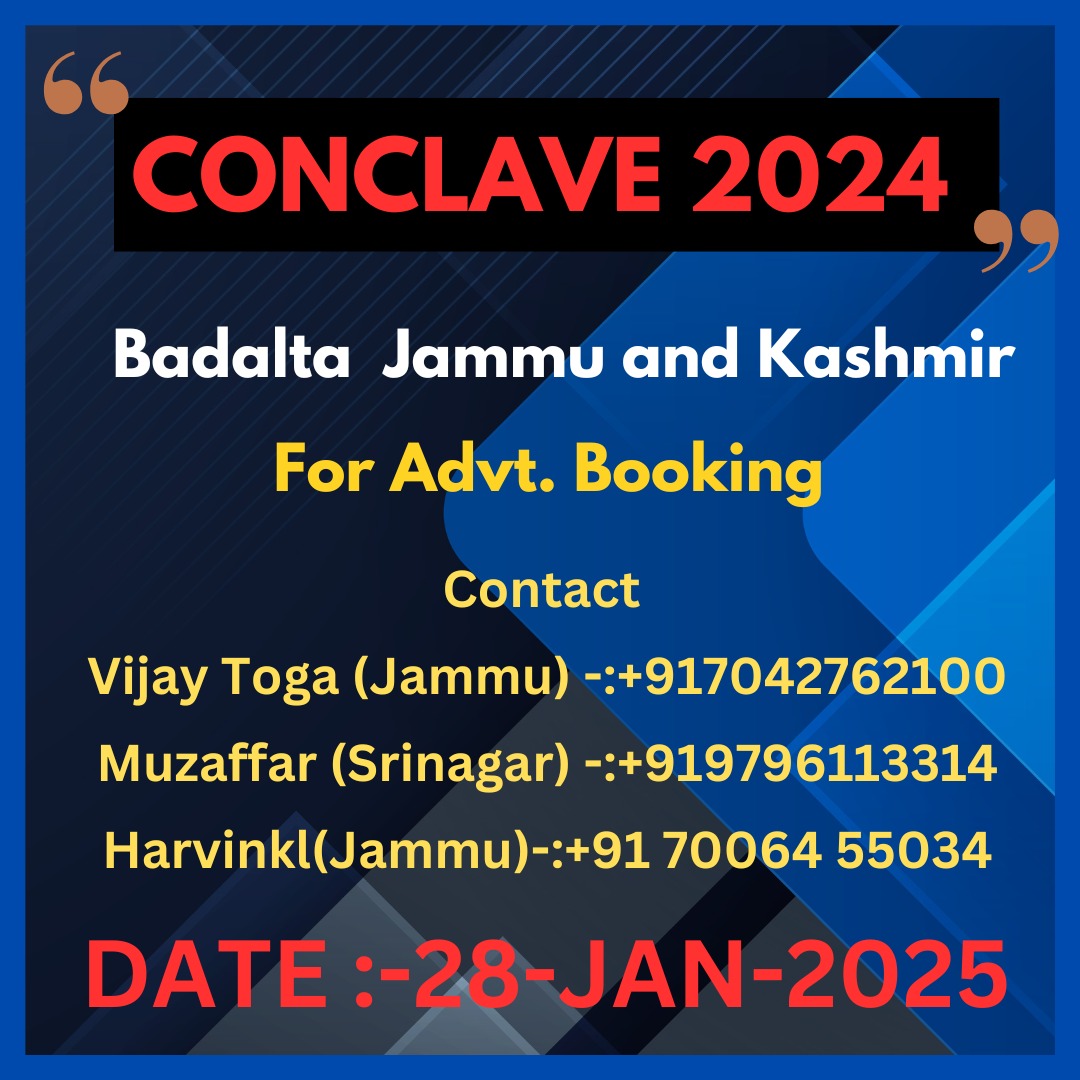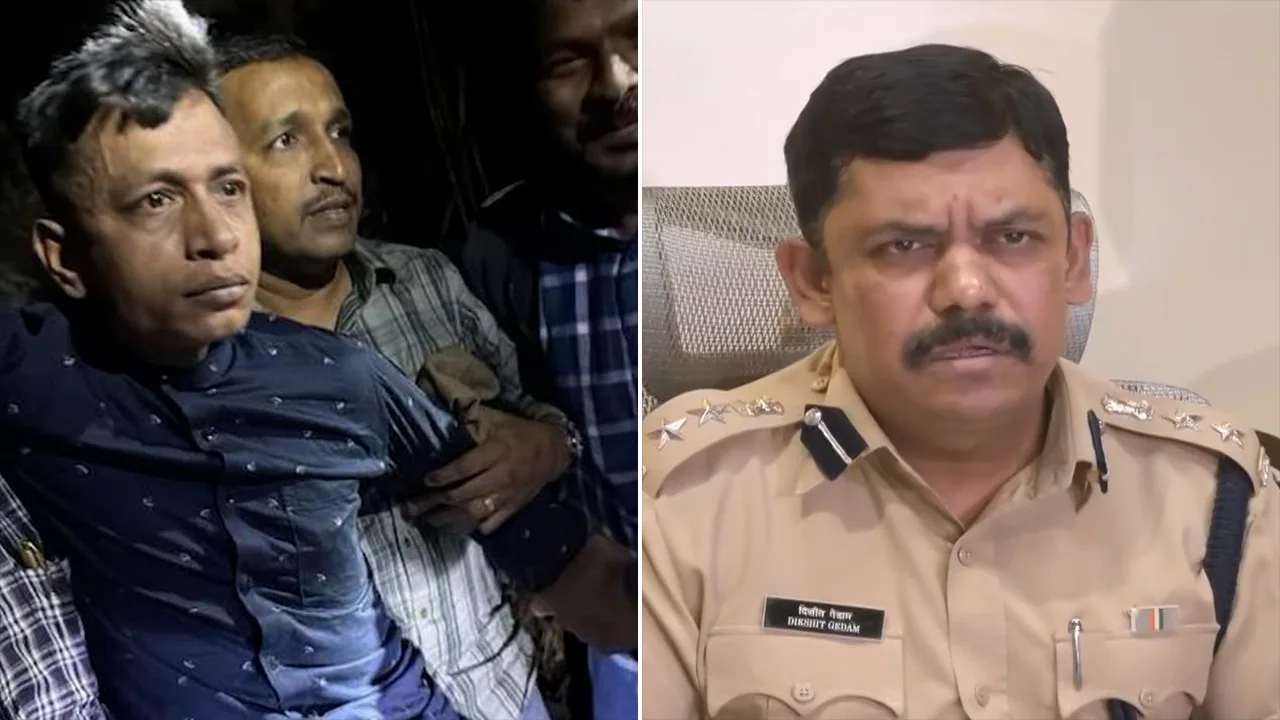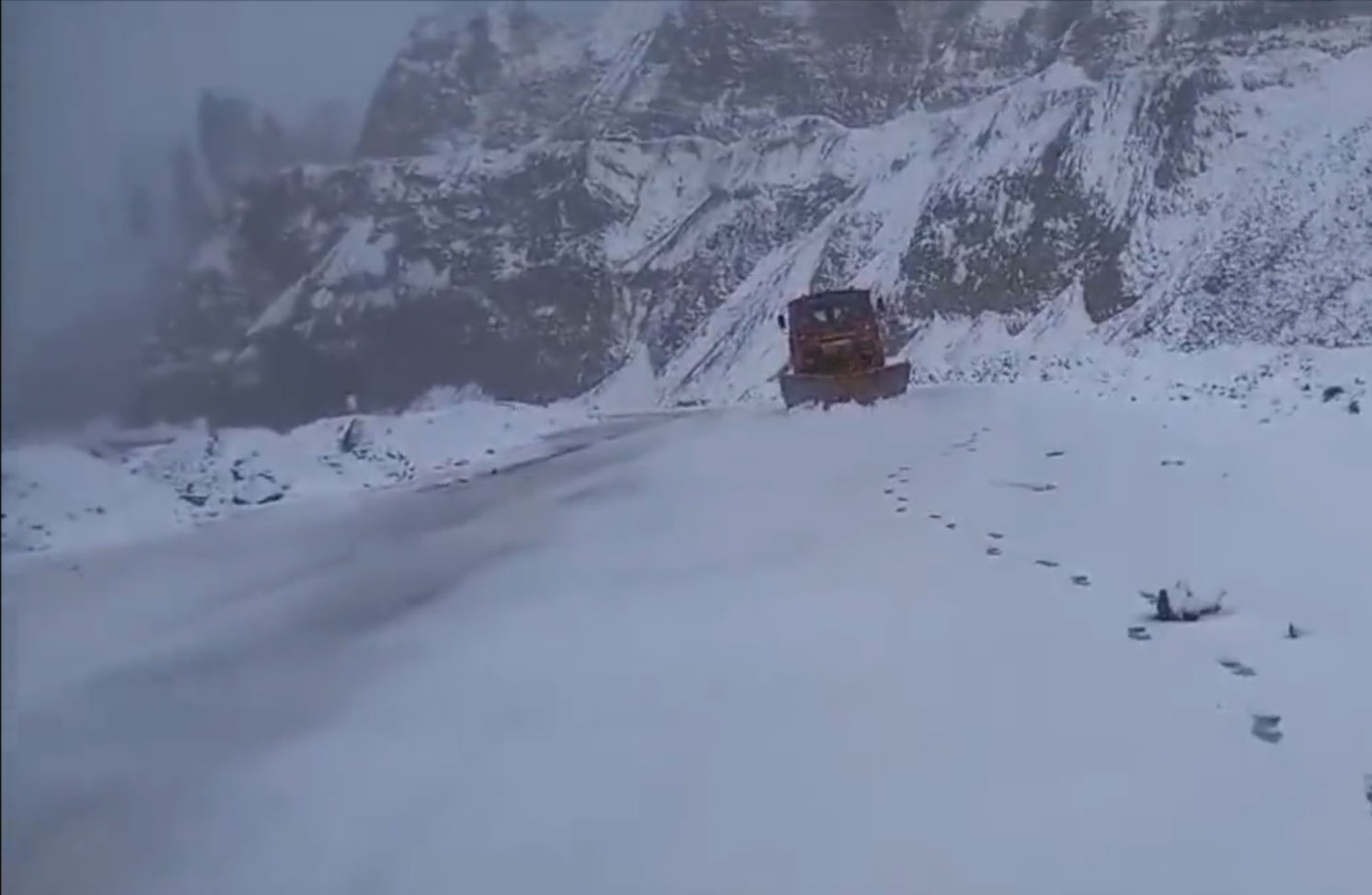JAMMU, Apr 6: Former Union Minister and DPAP chairman Ghulam Nabi Azad has charged late Mufti Mohammad Sayeed of “hijacking” the Government formation in 2002 by becoming the Chief Minister with just 16 MLAs while he despite having the support of 42 MLAs had to return to national politics, a charge which was denied by the PDP today.
Azad, who went on to become the Chief Minister after three-year term of Mufti Sayeed in November 2005, said this in his book ‘Azaad An Autobiography’ which was released in New Delhi by former Union Minister Dr Karan Singh in the presence of top political leaders of various parties.
Azad also wrote about Farooq Abdullah’s strained ties with Jagmohan, former two-time Governor of Jammu and Kashmir, and his relations with Prime Minister Narendra Modi.
The PDP had withdrawn support to Azad Government nearly about six months before completion of his term in 2008 leading to imposition of President’s Rule in Jammu and Kashmir followed by Assembly elections in November-December after which National Conference-Congress formed the coalition headed by Omar Abdullah.
Asserting that Mufti Sayeed misused his “generosity” to become Chief Minister of Jammu & Kashmir in 2002, Azad said it was he who offered Mufti to be part of the Government when he (Azad) had a letter of support from 42 MLAs to become the Chief Minister.
“With the letter of support of 42 MLAs in my hand, I telephoned the Governor, and he invited me the following day to discuss the date of oath-taking. I informed Sonia Gandhi about the developments over telephone. She was happy to hear that I was now taking charge of the Government formation,” Azad mentioned.
Narrating the incident, he said a few hours before the meeting with the Governor, around 8.00 a.m., he was in the balcony of his room of Hotel Broadway in Srinagar, having tea with Ashok Bhan, a friend, Congressman and lawyer of the Supreme Court, when a thought occurred to him.
“Perhaps it was driven by emotions. I told Bhan that I should ask Mufti’s party to join the Government. I had a long family association with him, which I had maintained even after his split with the Congress. Though I did not need his backing to form the Government, I believed that with he on board, the Government would be even more stable and could perform better. Besides, he had been a Congressman, and his MLAs could be co-opted in the Government,” Azad, who quit the Congress last year to form his own political party, DPAP, said in the book
Recalling that Mufti made him wait, saying he needs 3-4 days to think over the proposal, Azad said he telephoned Mufti and informed him that he would be meeting the Governor at 11.00 a.m.
“I suggested that his party could be part of the Government and asked him to give me names of five–six MLAs of his party who could be accommodated as Ministers. Mufti said that it was a good idea and immediately invited me for breakfast, saying that he could go to the Raj Bhavan after having breakfast with him; I readily agreed. I had breakfast with him at his residence and repeated my offer. He heard me out and said that he wanted three–four days to think it over. He suggested that I better defer my meeting with the Governor until then,” Azad wrote.
He said that he trusted Mufti Sayeed and didn’t spot his deviousness.
“I should have seen through his game plan then and gone ahead with the oath-taking; after all, his party could have joined the Government later. But I trusted him implicitly and did not spot his deviousness. How was I to know that he would throw our personal relations to the wind and misuse my generosity! I met the Governor and briefed him about my talks with Mufti that morning, also informing him that I would get back to him after three–four days,” the former CM wrote.
He said Mufti confirmed participation in his Government when he and Dr. Manmohan Singh, the then Leader of the Opposition in Rajya Sabha, met him in Srinagar.
“I returned to Delhi and narrated the whole story to Sonia Gandhi. It was decided that Dr Manmohan Singh, then the LoP in the Rajya Sabha, and I would fly to Srinagar and meet the PDP leader to firm up his party’s inclusion in the Government. The following day, Dr Singh and I went to Srinagar and had lunch with Mufti, during which he confirmed his party’s participation in the Government,” he added
According to Azad, Mufti got up in an agitated state during the meeting called by Sonia Gandhi in New Delhi for announcing the alliance when he was asked to give names of 5-6 MLAs from his party who could be accommodated as Ministers.
“Thereafter, Sonia invited Mufti to Delhi for final announcement of the alliance. I, too, was present at the meeting. Mufti thanked the Congress president and me for agreeing to his party’s participation in the Government. But when he was asked for names from his party who could be part of my Government, he suddenly got up in an agitated state and exclaimed, ‘I thought that I had been invited to be the Chief Minister!’ Sonia Gandhi and I were aghast and said that no such indication or assurance had been given from our side at any point of time. Mufti nearly shouted back that he had been called to Delhi to be insulted. ‘Why was I called? I could have been informed over the telephone.’ It was clear that he wanted to hijack the Government,” Azad said.
He wrote that he himself intervened and requested Sonia Gandhi that a power-sharing arrangement could be worked by which he would be CM for the first three years and Mufti for the next three years.
“When matters seemed to be going out of hand, I intervened and requested Sonia Gandhi that an arrangement could be worked out by which I would be CM for the first three years and Mufti could take over for the next three years (then the J&K Government’s term was of six years). This way, everyone would be happy. However, Mufti, having got a toehold, now wanted full entry through the door. He insisted on being the CM for the first three years.
Sonia was in no mood to relent. Again, I requested her that in the larger interest of the State, we should agree to his demand. That is how Mufti, whose party had come third in the elections, with just 16 MLAs, became the CM, while I, despite having the support of 42 MLAs, had to return to national politics,” he said.
Azad also mentioned in detail about National Conference president Dr Farooq Abdullah’s strained relations with two-time J&K Governor Jagmohan Malhotra.
“In January 1990, Jagmohan Malhotra was appointed as the Governor of the State against the wishes of then CM Farooq Abdullah. Both did not see eye to eye; they never did even during Jagmohan’s earlier stint in 1984 when Rajiv was the PM and the NC was then in alliance with the Congress party in the State. It was during this first stint of Farooq as the CM that his Government was toppled by a rebellion led by G.M. Shah, his brother-in-law, who was also a senior Minister.
“The NC split into two groups, one owing allegiance to Farooq and the other to Shah. Shah did not have the majority to form the Government, but Mufti, who was the State Congress president and also bitterly opposed to Farooq, extended support to Shah. These developments had happened under Governor Jagmohan’s watch,” Azad recalled.
He said during CM Shah’s tenure, the Government remained unstable, and Jagmohan exploited the situation to exert his authority and became more assertive. Even after the coalition of the NC under Farooq’s leadership and the Congress party coming to power in November 1986, Jagmohan continued to throw his weight, which angered Farooq. In the midst of Jagmohan’s over-assertiveness, three horrific massacres of civilians took place in the State. The Governor was held accountable and removed within a few months, he added.
“Jagmohan’s second-time arrival compounded the problem for both the Centre and the State. Farooq was against Jagmohan’s appointment as Governor. He was correct in saying that he couldn’t have fought militancy without the full support of the Governor. He decided to quit against the appointment. With Farooq’s resignation, J&K again came under Governor’s Rule. With this decision, the Congress party and NC completely lost connection with the State administration headed by Jagmohan; at the national level, the Congress party was already in Opposition since December 1989,” Azad wrote.
On relations with Prime Minister Narendra Modi, Azad said he shared warm ties with friends in almost every political party and Narendra Modi was one of them.
“A lot has been said about my relationship with him. I have known Modi since the late 1990s, when he was the general secretary of his party and I was the general secretary of mine. Both of us would also occasionally come face to face on television debates. However, before the show or after, we would have tea in the TV studio at the request of the anchors.
My first impression about him was that he did not know much. I thought that the BJP had sent just another person from Gujarat for the TV discussion. But when it was his chance to speak, he turned out to be very different. He was vocal, firm, knowledgeable and well-prepared on the subjects being discussed. He did not duck a single question. He was one of the best participants in the subsequent discussions. Still, I never imagined that he would one day be the CM, let alone a powerful PM,” Azad said.
Referring to the Prime Minister Narendra Modi’s address in the Rajya Sabha during his retirement in February 2021, Azad said he praised me for my performance as LoP and for being a good human being.
“His speech was totally unlike his other speeches. He got very emotional, especially when narrating a particular incident. Everyone had forgotten about it, as it was from 15 years back, when I was the CM. I too had forgotten about it. He went back to 25 May 2006, when militants in Srinagar had hurled a grenade at a tourist bus carrying tourists from Gujarat. The attack took place when the Government shifted to Kashmir in the first week of May, and the militants attempted to create a sense of fear and panic in me. They ‘welcomed’ me by killing innocent people in this horrifying incident.
“On the morning of 25 May, I received information that militants had attacked a bus carrying passengers from Gujarat. Some passengers, including two children, were killed and several were injured. The bodies of the dead had been mutilated. The site of the attack—in the neighbourhood of Batpora—was close to my official residence, so I was able to rush to the site immediately and saw women and children weeping bitterly. I too was moved to tears. It was at this juncture that CM Modi called me. My staff told him that I was in no condition to speak with him since I was completely shattered,” Azad said.
He said Modi’s farewell speech, which was given wide coverage by the media, should have been a matter of great pride for the Congress party as well as its leadership, as a senior member of the party was feted by none less than the PM and by the leaders of other Opposition parties.
“Unfortunately, instead of appreciating my efforts and concern for the people of Gujarat and the tribute that the PM paid to the LoP of the Congress, the party leadership was extremely unhappy and critical. They dubbed me a BJP man. This clearly shows that they have no empathy for human tragedy and cannot think beyond petty politics. This is further reinforced by the fact that none of these Congress leaders or my opponents quoted a single good word said by almost two dozen other political leaders. If they were honest, they should have quoted those as well,” Azad wrote.
Meanwhile, PDP leader Nayeem Akhtar today rubbished claims made by veteran politician Ghulam Nabi Azad on the formation of a PDP-Congress alliance in 2002, saying his statements did not add up to a “very credible presentation of facts”.
“I think what Azad said does not add up to a very credible presentation of facts. Azad is reported to claim that he had 42 MLAs with him. Then why didn’t he straight away go and stake the claim (to Government formation),” Akhtar said.
The former bureaucrat, who was a close aide of Sayeed, wondered how a party with just 16 members could “blackmail” Gandhi on Government formation.
“It’s a narrative that Azad has presented. He has been the longest player at the national level, he has been quite an important player in national politics but our limited concern is about what has been reported in the press as part of this book related to the 2002 formation of the PDP-Congress Ministry in the State.
“How could a party with 16 members at number 3 in the table of seats blackmail Sonia Gandhi form a Government with the Chief Minister (coming) from that party of 16?” he asked.
Akhtar said Azad’s narrative on those very important days of Kashmir’s history is the “lack of appreciation of the atmosphere those days”.
“It’s my feeling that Sonia Gandhi perhaps had greater appreciation than Azad ever had, even as the Chief Minister of Jammu and Kashmir,” he said.
“Congress had taken note of this that Kashmir perhaps wanted a change and they had given many seats to the PDP in Kashmir valley which was at the centre of trouble so perhaps they wanted to give this experiment a try and give a sense of achievement to the people of Kashmir who had always been traditionally denied the right to choose their leader,” he said.
“It was a very historic moment which unfortunately came to halt in 2005 after the changeover. A (peace) process that was started in 2002 and 2005 with Mufti in J&K and Prime Minister Atal Bihari Vajpayee and later Sonia Gandhi and Manmohan Singh in Delhi, came to an abrupt end in 2006… (It) was perhaps the last chance Kashmir had for permanent resolution and peace,” he added.









